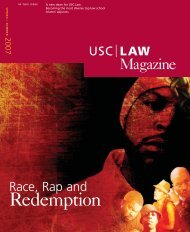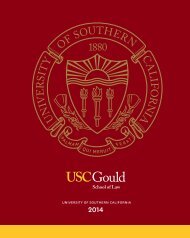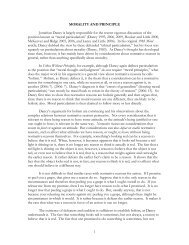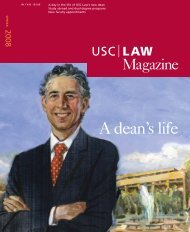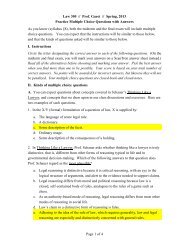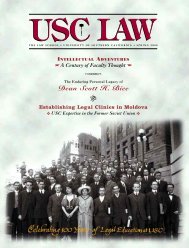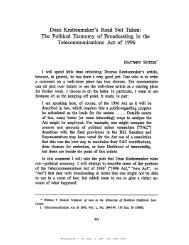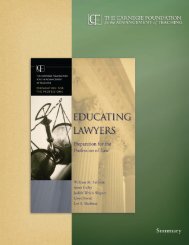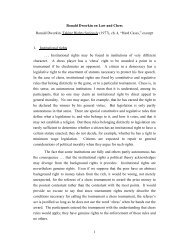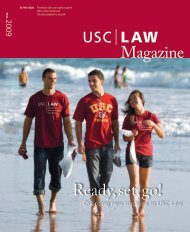download issue - USC Gould School of Law - University of Southern ...
download issue - USC Gould School of Law - University of Southern ...
download issue - USC Gould School of Law - University of Southern ...
You also want an ePaper? Increase the reach of your titles
YUMPU automatically turns print PDFs into web optimized ePapers that Google loves.
Spring / Summer 2006<br />
Magazine<br />
Alumni Pr<strong>of</strong>iles<br />
29<br />
For the<br />
children<br />
Andrea Ramos ’92 seeks to help<br />
youth fulfill their potential<br />
Five years after graduating from <strong>USC</strong> <strong>Law</strong>, Andrea Ramos ’92<br />
landed on the public service career path she had envisioned<br />
as a student.<br />
Ramos — who was involved in <strong>USC</strong>’s Public Interest <strong>Law</strong><br />
Foundation and the Post-Conviction Justice Project — says she<br />
knew she wanted to practice public interest law full time, but<br />
she also needed to take care <strong>of</strong> student loans.<br />
After graduation, she spent five years in business litigation at<br />
Tuttle & Taylor, choosing the firm because it would allow her to<br />
take pro bono cases. She also found a structured learning environment<br />
that was so supportive she would recommend her career<br />
path to other public service-minded lawyers.<br />
“Starting out at a private firm was great experience for me,”<br />
Ramos says. “It also was a really good way to get acquainted with<br />
different agencies.”<br />
In fact, Ramos became familiar with Public Counsel — the<br />
nation’s largest public interest volunteer organization — by doing<br />
pro bono work alongside attorneys such as <strong>USC</strong> <strong>Law</strong> Pr<strong>of</strong>essor<br />
Niels Frenzen. Ramos joined Public Counsel in 1997 as a staff<br />
attorney and worked for seven years in the school-based legal<br />
assistance project/teen legal clinic. Last year, she was named<br />
directing attorney <strong>of</strong> the Children’s Rights Project.<br />
“Clearly her heart and her head were interested in doing that<br />
type <strong>of</strong> work full time, and she was able to transition from the<br />
for-pr<strong>of</strong>it world to the nonpr<strong>of</strong>it world,” Frenzen says. “She’s an<br />
extremely dedicated lawyer, and she’s a great asset for Public<br />
Counsel. She’s smart and devoted to her work.”<br />
In addition to the school-based clinics, the Children’s Rights<br />
Project includes 12 service areas, eight attorneys and three social<br />
workers. The clinics, located at middle and high schools, are consistently<br />
packed with students and their families who are facing<br />
legal <strong>issue</strong>s ranging from immigration to child custody.<br />
“It’s a very successful program. We’re just booked when we<br />
go in there,” Ramos says.<br />
The rewards <strong>of</strong> helping so many children and families truly hits<br />
home when Ramos looks back on some <strong>of</strong> her strongest successes,<br />
such as AB540, the state bill passed in 2001 that allows all California<br />
students to pay in-state tuition when attending state universities.<br />
Until that time, many students who were brought into the country<br />
illegally were, in effect, barred from attending state universities<br />
because they were forced to pay out-<strong>of</strong>-state tuition, which is<br />
significantly more expensive.<br />
“Students would <strong>of</strong>ten discover — at the moment <strong>of</strong> applying<br />
to college — that they were undocumented,” Ramos says. “They<br />
just didn’t know. It was completely heart-wrenching to talk to<br />
these kids, who were <strong>of</strong>ten straight-A, honor roll students, and<br />
have to tell them, ‘You can go to college, but you will have to pay<br />
about $30,000 a year.’ ”<br />
Ramos flew with a group <strong>of</strong> students to Sacramento to testify<br />
before the State Assembly in support <strong>of</strong> the bill.<br />
“For some <strong>of</strong> the kids, it was difficult to come forward because<br />
there is a stigma to being here illegally,” Ramos says. “But they<br />
thought it was important, so they spoke up.”<br />
— Lori Stuenkel




